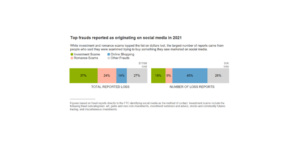They say you have to be careful on social media these days. For instance, it’s best not to accept a friend request from Xerox because it could turn out to be a scan. All kidding aside, new reports show that scams on social media almost doubled in 2021 compared with 2020. In numbers, that translates into over 95,000 people who reported financial losses resulting from online frauds that started on social media platforms.
Let’s burrow more into the full picture of social media scams and useful tips to stay away from them.
US Consumers Lost $770 Million Due to Targeted Advertising
US’s FTC (Federal Trade Commission) recently released a public report detailing the concerning situation of scams and frauds lurking on social media. All reported cases have summed up to $770 million in losses due to various e-commerce schemes. Bear in mind these numbers solely relate to US population and reported cases. If you could take into account unreported ones and the worldwide population, financial losses would be far greater.
According to the FTC, there were 18 times more reports of social media scams in 2021 compared to 2017. Also, the social media realm brought more profits to scammers than any other method of reaching people, with targeted advertising as the primary driver of online scams. Meta’s Facebook and Instagram are the dominant platforms where people have been targeted with shopping scams.
Almost 70% of scam victims placed an order for an online item after seeing an ad and never received what they’ve purchased. In some cases, these ads redirected users to perfectly replicated websites of popular retailers.
Other important statistics data the FTC report revealed:
-
-
- investment scams were the most common way people lost money on social media, reaching $285 million of financial losses in 2021;
- fake news or unsubstantiated theories around COVID-19 therapies has been one of the most exploited schemes;
- people aged between 18 and 39 were twice as likely to be targeted by scams compared to older age groups.
-
The FTC agency inferred there are many types of fraud lurking on social media, and new ones emerge all the time. One example relates to encouraging users to take part in a book exchange. What seems like an innocent practice turns out to have the ingredients of an illegal pyramid scheme. If you’d agree to this scheme, the scammer will ask you to provide your name and contact information, plus the names and details of a few of your book-addicted friends. Then, you would be allowed to send one book to a stranger, and you’d receive 36 books from other members from around the world. What sounds too good to be true really is that way because you wouldn’t receive any book, but scammers would have received your contact information and your friends’ personal data too.
Now, let’s find out how to avoid being scammed on social media.

FTC, Top frauds that started on social media in 2021
Tips to Avoid Most Common Social Media Scams
They’re tricky and deceiving and sometimes could even try to take advantage of the goodness of your heart. Here are the most common social media scams that involve financial losses and how you can stay away from them.
Buyer Overpay Scams
If you’re using Facebook Marketplace or a similar online sales platform to sell items, be wary of a few scam signs. An interested buyer contacts you in an overpayment scam but will try to overpay with a check when making the order. The scammers will ask you to either refund the extra amount directly back to them or a “friend” via wire transfer or cash. The end result is you’ll be left without the entire sum you requested for the item, and the item itself as the fraudulent check never clears, and funds are removed from your account.
Tip: don’t accept checks for items that you’re selling.
Seller Requests Wire Transfer Scams
When you’re a potential buyer, and you contact the seller, you’d find out your requested item isn’t available for you to pick it up. The seller insists on delivering it to your doorstep, but they’ll require you to send a wire transfer or use another online payment. Once you do, your purchase will never be delivered, and you won’t be able to find or contact the seller either.
Tip: buy only from reputable sellers and use only trusted third-party services with each online payment.
Romance Scams
Romance or “sweetheart” scams count on making people believe they’re in a romantic relationship with someone they met online. On ‘the other side,’ is strictly a cyber-scammer trying to extort some money with a fake identity. This cybercrook will ask for money by alluding to a financial emergency or issue. They may request small or large amounts, but once they gather those willing to send money, they’ll go on with this scam indefinitely until victims stop sending money.
Tip: don’t send money to people you’ve never met in person, and never send your banking credentials to anyone.
Charitable Cause Scams
Online charity scams can take many shapes and forms on the web. On social media, they harness trending items or claim to collect money after major events, like disasters. Scammers would impersonate legitimate charity organizations by mimicking their websites. In the end, all the raised money never reach people in need.
Tip: check misspellings of URLs, double-check the legitimacy of requested donations, and don’t share your personal details.

Money Mule Scams
For an ” incredible offer”, these scams use the “get-rich-quick” pretext of tricking you into depositing a check or providing your bank account info for an “incredible offer. Yet, this is the typical scheme where the scammer tries to get you to either help move stolen money or to gain access to your money. Once again, it involves depositing a check into your account and sending the scammer a part of the funds via wire transfer while you keep the rest as a fee for helping.
Tip: checks and wire transfers are harder to trace, so on social media or anywhere else online, use a trusted payment service.
Additionally, keep in mind to always treat links with suspicion, so double-checking their source is always an important step. Avoid oversharing too many personal details on social media as scammers will exploit any information to try to get to you.
A VPN app should always come in handy to conceal as much as possible of your digital activities. This will keep snooping eyes at bay and greatly improve your privacy.
Have you ever been a victim of a social media scam?
Let me know in the comments section below.



Leave a comment